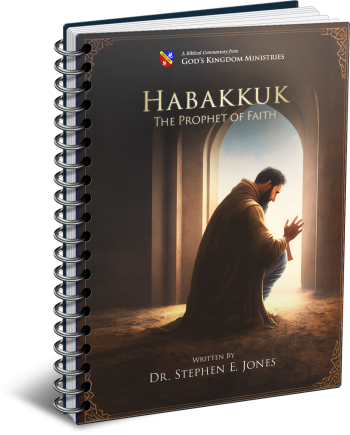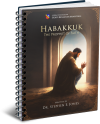Latest Posts
View the latest posts in an easy-to-read list format, with filtering options.

Habakkuk is a prophet of faith that is tested by delays. We can all identify with him.
Category - Bible Commentaries

In Hab. 1:1-11, the prophet raises old questions about God’s justice.
The prophet has the boldness to ask the tough questions from a position of faith. He is therefore not a doubter, nor even an honest doubter. He boldly raises the questions that trouble most people, but he is also willing to wait for God’s answers. When the answers are delayed, it does not shake his faith, because his faith has been “tested by fire” (1 Pet. 1:7) in the purgatory of time.
In Hab. 1:6 God says, “I am raising up the Chaldeans.” How could a just God raise up ungodly nations to judge His people? Would this not violate the holiness of a righteous God? How could God side with the Chaldeans, who were even more wicked than the people of Judah?
In part, I believe the answer to the prophet’s question lies in the fact that God had not revealed Himself to the Chaldeans—not in the way in which He had revealed Himself to the Israelites at Sinai and later through the prophets. Liability is greater to those who know God’s will and refuse to do it. Jesus said in Luke 12:47 and 48,
47 And that slave who knew his master’s will and did not get ready or act in accord with his will, will receive many lashes, 48 but the one who did not know it and committed deeds worthy of a flogging, will receive but few. From everyone who has been given much, much will be required; and to whom they entrusted much, of him they will ask all the more.
James echoes this as well in James 4:17, saying,
17 Therefore, to one who knows the right thing to do and does not do it, to him it is sin.
There is a basic knowledge of good and evil that has been revealed to all men, and on account of this knowledge, all men share some level of liability. Rom. 1:18-20 says,
18 For the wrath of God is revealed from heaven against all ungodliness and unrighteousness of men who suppress the truth in unrighteousness, 19 because that which is known about God is evident within them; for God made it evident to them. 20 For since the creation of the world, His invisible attributes, His eternal power and divine nature, have been clearly seen, being understood through what has been made, so that they are without excuse.
Nonetheless, Israel and Judah had greater liability for sin than did the Chaldeans. Moses told the Israelites in Deut. 4:8,
8 Or what great nation is there that has statutes and judgments as righteous as this whole law which I am setting before you today?
The same is true in the latter days of our captivity to Mystery Babylon. The modern Chaldeans have been raised up by God to judge the church even though they are more wicked than the church. The church claims to have the word of God for all to read, so this gives the church greater liability for rejecting the law of God and the prophets. We expect lawlessness from Babylon but not from the church itself.
Hab. 1:12 says,
12 Are You not from everlasting [khedem, “of old, aforetime, from the East”], O Lord, my God, my Holy One? We will not die. You, O Lord, have appointed them to judge, and You, O Rock, have established them to correct [yakah, “decide, reprove, correct].
The prophet calls God “Yahweh,” “Elohim,” and “khawdosh,” all terms found throughout other Scriptures. His use of these terms recognizes that God is both sovereign and holy, implying that He will judge righteously. The prophet thus recognized that God Himself had “appointed them to judge” and had “established them to correct.” In other words, God had granted them both authority and responsibility.
By using the term yakah, the prophet recognized that God’s judgments were corrective in nature and were not intended to kill or execute sinners. But wait! Did not many people die at the hands of the Chaldean army? Yes, indeed, but from God’s perspective, death is not an end in itself. Resurrection puts an end to death—both the first and second death.
The law of Jubilee, which is an expression of the grace and love of God, limits all liability (debt). It guarantees that all judgment for sin-debt will ultimately come to an end purely by grace—that is, by the sovereign will of a loving God. While this law does not eliminate judgment, it limits the power of sin over all sinners so that in the end God does not lose any part of His creation.
Hence, the law of God does not violate His love-nature, nor does it prevent Him from reconciling creation in the end. Love overrules all else and no amount of sin-debt is able to overwhelm His jubilee.
When all sin has been judged, then the purpose of the law will be fulfilled. That purpose is to correct all things, thereby bringing the creation back into alignment with the undistorted image of God.
So the prophet was able to say truthfully, “We will not die.” In the immediate invasion, God would protect the remnant, the overcomers. But looking at it in the long-term, the law of Jubilee guaranteed the restoration of all things, so that all would be given life at the end of the final age. The Jubilee, in fact, is the ultimate fulfillment of the promise of God. Only in this way could God become “all in all” (1 Cor. 15:28).
In Hab. 1:13, the prophet says,
13 Your eyes are too pure to approve evil, and You cannot look on wickedness with favor. Why do You look with favor on those who deal treacherously? Why are You silent when the wicked swallow up those more righteous than they?
The law of God, which reflects His nature, cannot “approve evil” or “acquit the wicked” (Nahum 1:3, KJV). The law can only judge sin, holding sinners liable for the duration of their just sentence. Yet the law of Jubilee also sets a time limit upon the length of judgment.
Such is the righteousness of God.
The prophet, however, knew that God had raised up the Chaldeans to judge those who were “more righteous” than themselves. Did the prophet himself not know the answer? Was he writing on behalf of the people who lacked such understanding of the ways of God?
We are not told, but even prophets must wrestle with such monumental questions about God’s character and His justice. I believe that Habakkuk did indeed seek God’s face to get an understanding of these troubling questions. I believe that by the end of the progressive revelation of God set forth in his book of prophecies, he was given a clear understanding of the answers to these questions.
That, of course, may have taken many years, or even a lifetime.
The prophet continues in Hab. 1:14, 15,
14 Why have You made men like the fish of the sea, like creeping things without a ruler over them? 15 The Chaldeans bring all of them up with a hook, drag them away with their net, and gather them together in their fishing net. Therefore, they rejoice and are glad.
Here the prophet uses a metaphor to compare the men of Judah to fish and the Chaldeans to fishermen. Though fish often swim in schools, they do so without apparent leaders. So also the prophet compares the men of Judah to “creeping things without a ruler over them.” No one has observed a king over the creeping things. No leader tells the rest to follow him as he leads the way.
The people of Judah, then, are devoid of righteous leaders. Perhaps we may add another common metaphor found in Isaiah 53:6,
6 All of us like sheep have gone astray. Each of us has turned to his own way…
Judah often had bad kings to lead the nation. But even with good kings, many of the people went astray. The nation had good shepherds and bad shepherds, but the nature of sheep tends toward going astray until they learn to follow the voice of the Good Shepherd.
The Chaldeans had hooks and nets with which to catch the men of Judah. Hooks tempt the fish with bait, and nets catch fish against their will. The antidote to the Chaldeans was seen when Jesus called His disciples. Mark 1:17 says,
17 And Jesus said to them, “Follow Me, and I will make you become fishers of men.”
The comparison between men and fish was probably not new to the disciples. Though Habakkuk was not the primary Scripture that was taught to children, the metaphor had already been embedded in the Hebrew culture itself. Paul himself had studied Habakkuk, as he quoted Hab. 2:4 in Rom. 1:17 and in Gal. 3:11.
This metaphor also extended to Jesus’ statement in John 12:32,
32 And I, if I am lifted up from the earth, will draw [helkuo, “drag” as with a dragnet] all men to Myself.
Though the main thought here is to compare Himself with the serpent on the pole in the wilderness, the result of His death pictures Him casting out a dragnet to capture “all men.” As I wrote earlier, a hook tempts the will of a fish, but a net overrules the will of the fish.
The disciples were to become “fishers of men,” baiting sinners with the reward of immortality. But in the end, Jesus’ work on the cross was done “not of the will of man, but of God” (John 1:13). The net was a sovereign act of God.
Yet the prophet sees that the Chaldeans also have nets of their own. They too are “fishers of men,” but their nets are used to feed themselves in a self-serving manner to gain wealth and power over men and nations.
Hab. 1:16 says,
16 Therefore they offer a sacrifice to their net and burn incense to their fishing net; because through these things their catch is large, and their food is plentiful.
The Chaldean “net” in this case was not literal but symbolic of the fact that they could catch nations in their “net” and thereby subjugate them and rob them of all their possessions. Hence also, their “sacrifice to their net” was also symbolic, in that they attributed their success to the strength of their gods. Their “sacrifice of praise” (Heb. 13:15) was to false gods, not to the true God of the Bible.
Hab. 1:17 continues,
17 Will they therefore empty their net and continually slay nations without sparing?
Here the prophet asks if the Chaldeans will ever end their conquest “and continually slay nations.” This is related to the prophet’s original question in 1:2, “How long, O Lord?” When a nation is brought into divine judgment, the people despair because they can see no end to their captivity. But because there is a law of Jubilee, there is always an end, even if that end is delayed until the end of the age.
Only the prophets and those who believe the word given through them are able to have this hope, for they are the ones who live by faith, which comes through hearing the word. Even so, such hope is tested and purged by time and many apparent delays.